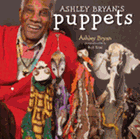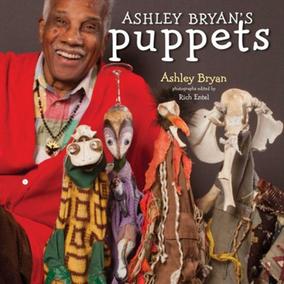
 This beautifully designed picture book opens a window into how author-artist and craftsman Ashley Bryan (Can't Scare Me!) resuscitates found objects as expressive puppets.
This beautifully designed picture book opens a window into how author-artist and craftsman Ashley Bryan (Can't Scare Me!) resuscitates found objects as expressive puppets.
"Ashley, what will you name me when my garment is complete?" the book begins, as Bryan holds high a puppet draped in a texture that resembles fur, its head a metallic gold. Stained glass scenes of flowers and people dangle from the top of a pine window frame, and bundles of fabrics, yarn and other artistic ingredients top his workspace in orderly disarray. On the next page, we see "treasures, washed in from the sea" that surround Bryan's island home: shells, driftwood, animal bones and glass polished by hundreds of waves. "I cannot rest till I create a life that we may celebrate," says the accompanying text. Next, Bryan introduces eight puppets made from his treasures, lined up as if for a curtain call on a double-page photo spread. This is the first of four such spreads. (Readers get the answer to the opening question with the final line-up.)
Bryan presents storytellers--Spider ("I'm Spider Anansi./ I spin without rest/ A close web of stories/ For cradle and nest") and Jojo, fashioned of three gloves and a quilt gown ("In every finger of my glove/ I tap tall tales of peace and love"). Creatures of the sea--Pepukayi, a frog wedded to a mermaid--appear with creatures of the land, such as Kwesi, with shoulder bones as perfect ears, and rib bones for a tusk ("I'll journey now to Africa/ A proper elephant"). Plus leaders such as Abayomi: "Ruler of People," with a crest of branches "like antlers/ that stick up for me," who delivers a heartwarming message: "I stick up for others/ So all may live free;/ I'm grateful for antlers/ That stick up for me."
The elegant design features the figures in their best light, sometimes in close-up on the left, other times on the right. A band of color behind the poem sometimes separates the close-up from the full-figure view, other times it creates a bookend. The characters' placement in the book creates symmetry, such as Kitaka the "Good Farmer," whose limbs are made of forks, followed by Changa ("Strong as Iron"), with limbs made of spoons.
Bryan ends with inspiration. Says the Spirit Guardian, "When you close this book/ And look up,/ You'll see puppets everywhere." Readers will be on the hunt for their own found objects, and will return to these pages over and over to see how Ashley Bryan breathed life into these marvelous characters. --Jennifer M. Brown
Shelf Talker: The resourcefulness and imagination behind Ashley Bryan's puppets, whose personalities come through in his poems and costumes, will inspire children to create their own characters.

